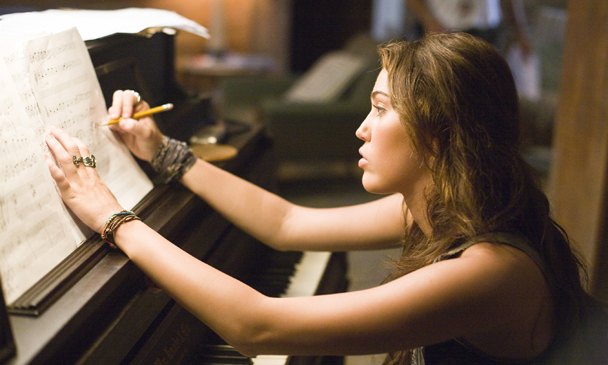The Last Song
Clearly the next in what is sure to be an extended run of the Nicholas Sparks franchise, and is a vital career-stepping stone for Cyrus.
Plot summary
A drama centered on a rebellious girl who is sent to a Southern beach town for the summer to stay with her father. Through their mutual love of music, the estranged duo learn to reconnect.

Nicholas Sparks writes weepy to a formulaic tee. His popular tear-jerking novels, including The Notebook, Walk to Remember, and recently adapted Dear John, have proved profitable on the big screen. They invite the scores of die-hard fans equipped with copious tissues to sob over the latest manifestation of Sparks’ star crossed lovers. The author denies he is a romance-writer, comparing himself to Hemingway rather than Mills and Boon. But having completed the screenplay for The Last Song before finishing the novel itself, he must be aware, as are the studios pouring money into adapting his films, of the reason behind his audience pulling power.
Tween icon Miley Cyrus plays Veronica “Ronnie” Miller, an angst-ridden teenager with a frustrated mother and an estranged father (played respectively by Kelly Preston and Greg Kinnear). Ronnie and her little brother (the delightful Bobby Coleman) head off to spend the summer with their father at his Georgia beach house. Thus the irrefutable formula commences.
Ronnie is initially resistant to her father’s attempts at reconciliation, her parent’s desire for her to accept a place at prestigious music college Julliard (she hasn’t applied, but is so gifted the school have been watching her “since she was five”) and the local bitchy girls and a particularly obnoxious but devastatingly handsome young man, Will (Miley’s real-life boyfriend Liam Hemsworth). Throw in some overcoming of adversity, reversal of preconceptions and some unexpected tragedy and there’s your film.
The film falls down in the predictable areas; it is sentimental, contrived and transparently aimed at tugging on heartstrings and inducing brimming eyes. But seeing as this is the main attraction for enjoying films of the Sparks’ formula, fair enough. More surprisingly, The Last Song is a little more robust than you might expect. Cyrus gives a competent performance as the troubled teen, and shows a maturity far exceeding her previous performance in the big-screen version of Hannah Montana. It is clear that Sparks wrote the role with Cyrus in mind (he allowed her to choose the name of her character) and incorporates her musical background into the film by casting Ronnie as a prodigious pianist, a skill that took the actress just a few lessons to master.
The film’s director Julie Ann Robinson compared Cyrus’s thespian diversity to that of Julia Roberts, which although a little unrealistic does indicate that this might not be a one-trick pony. We are used to seeing young “America’s sweetheart” types disappearing down the Britney and Lindsay road, hopefully Cyrus’s potential will keep her on the straight and narrow.
Kinnear and Preston (in the first film role since the tragic death of her son Jett Travolta) manage to flesh out two-dimensional characters in an admirable fashion – Kinnear lends his particular brand of cinematic charm to hapless father figure, extradited from his community for an act he may or may not have been responsible for. The truly touching, read not schmaltzy, scenes in the film are the interactions between Ronnie and her father and their shared love of music.
The Last Song is clearly the next in what is sure to be an extended run of the Nicholas Sparks franchise, and is a vital career-stepping stone for Cyrus. It may be a predictable replica of story’s past, but you might find yourself coming away with more than just a tear-soaked tissue.
Click here to read the Pure Movies exclusive interview with Miley Cyrus.












COMMENTS